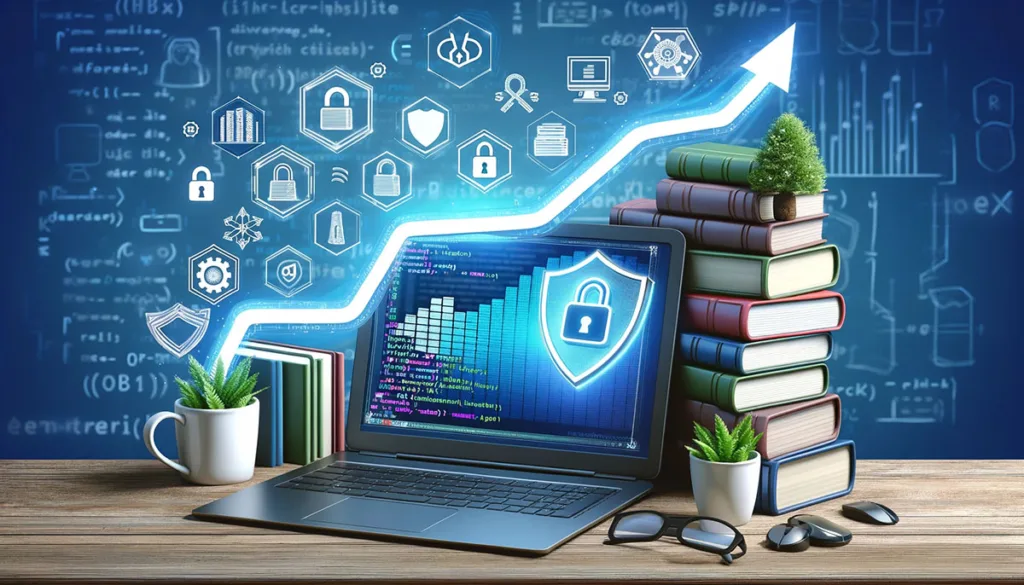- Introduction: Understanding Cybersecurity's Foundation
- Decoding Cybersecurity: Does It Always Require Coding?
- Launching Your Cybersecurity Journey: Key Skills and Qualifications
- Step-by-Step Guide to Entering the Cybersecurity Field
- Navigating the Coding Landscape: Learning to Code for Cybersecurity
- Career Paths in Cybersecurity: With and Without Coding
- Conclusion: Crafting Your Cybersecurity Career Path
- Frequently Asked Questions (FAQ’s)
Introduction: Understanding Cybersecurity’s Foundation
Cybersecurity involves methods, tools, and protocols to defend computers, networks, applications, and data against unauthorized intrusion, destruction, or theft. It’s fundamentally about preserving the integrity and confidentiality of information and technology infrastructures that form the backbone of our digital world.
Cyber attackers’ strategies are continually advancing in the fast-paced digital era, demanding a versatile and informed response from cybersecurity professionals. This environment necessitates a broad range of skills from cybersecurity professionals, including technical expertise, a comprehensive understanding of potential digital threats, and developing and applying effective security measures.
Coding and scripting have become central to cybersecurity efforts, empowering professionals to streamline protective measures, conduct thorough vulnerability assessments, and tailor defensive mechanisms against nuanced threats. For individuals aiming to deepen their expertise or carve out a niche in this expansive field, familiarity with the array of cybersecurity certifications can provide a clear path to specialization and career growth.
Decoding Cybersecurity: Does It Always Require Coding?


The Essence of Cybersecurity
At its core, cybersecurity is about protecting the digital universe from harmful actors. It is a constantly changing battlefield where experts strive to identify, prevent, and counteract threats. Coding plays a significant, but not all-encompassing, role in cybersecurity. It is a powerful asset in certain situations, like creating security tools or analyzing malware, but not all cybersecurity roles demand coding expertise.
When Coding Becomes Imperative
Understanding and manipulating code enables cybersecurity experts to customize security solutions, automate tasks, and accurately analyze attack methods. Proficiency in programming languages, particularly Python, for its ease of use in automation and security tasks, boosts a professional’s capability to innovate and effectively counter threats.
Yet, the cybersecurity field is broad, including roles from policy-making to educating users, where coding is secondary to skills in strategy, communication, and analysis.
Launching Your Cybersecurity Journey: Key Skills and Qualifications


Starting a cybersecurity career is an adventurous path with both opportunities and challenges. Success in this arena goes beyond mere technical skills.
Beyond Coding: A Holistic Skill Set
A well-prepared cybersecurity expert resembles a multifunctional tool, possessing various skills to address different issues. Essential abilities include critical thinking, problem-solving, and a grasp of cybersecurity principles and standards. These fundamental competencies and specialized knowledge in network security, ethical hacking, and risk analysis prepare a professional to face digital challenges effectively.
The Role of Coding in Cybersecurity
While not mandatory for all roles, understanding coding can significantly boost your efficiency in specific cybersecurity positions. Coding enables professionals to develop and modify tools, conduct detailed security evaluations, and grasp the technical aspects of threats and vulnerabilities. It is indispensable for roles emphasizing technical skills, such as penetration testing or security software development.
Step-by-Step Guide to Entering the Cybersecurity Field


Entering cybersecurity may appear overwhelming, but a systematic approach and appropriate resources can facilitate your journey. Here is a suggested pathway:
Foundation Building: Cybersecurity Courses
The Importance of a Strong Foundation
Comprehending cybersecurity is fundamental to defending the digital sphere. Cybersecurity courses serve as an entry point to the basics of the field, covering everything from elementary concepts to advanced topics like network security and risk management. These courses lay the groundwork for your career, equipping you with essential knowledge.
Where to Begin
Educational platforms such as Coursera, edX, and Udemy offer abundant learning resources created by top universities and companies. Initiating your learning with user-friendly courses like “Introduction to Cybersecurity” can clarify the fundamentals and guide your initial steps. As you progress, you can explore specialized areas to broaden your expertise.
Credentialing Your Skills: Cybersecurity Certifications
The Value of Certifications
In the competitive field of cybersecurity, certifications serve as evidence of your skills and commitment. They affirm your knowledge and can lead to advanced positions and improved career prospects.
Choosing the Right Certifications
Choosing the proper cybersecurity certification(s) involves a strategic approach based on your current skills, career aspirations, and the specific demands of the cybersecurity landscape you’re interested in.
The entry-level certifications for cybersecurity are:
- Microsoft Certified: Security, Compliance, and Identity Fundamentals
- CompTIA Network+
- CompTIA Security+
- (ISC)2 Systems Security Certified Practitioner (SSCP)
- Cisco Certified Network Associate (CCNA)
- GIAC Information Security Fundamentals (GISF)
The advanced level certifications are:
- Certified Information Systems Security Professional (CISSP)
- Certified Information Security Manager (CISM)
- Certified Ethical Hacker (CEH)
- Offensive Security Certified Professional (OSCP)
- GIAC Security Essentials (GSEC)
- Certified Cloud Security Professional (CCSP)
- CompTIA Advanced Security Practitioner (CASP)+
Immersive Learning: Engaging with the Cybersecurity Community
Staying Ahead of the Curve
Cybersecurity is a dynamic field, continually evolving with new threats and technologies. Active participation in the cybersecurity community keeps you informed and prepared. Engagement goes beyond mere learning; it involves exchanging experiences, facing challenges, and finding solutions.
How to Engage
- Follow Industry News: Stay informed with updates from sources like The Hacker News and Krebs on Security.
- Join Online Forums: Engage in discussions, seek advice and network on platforms like Reddit’s r/cybersecurity or Stack Exchange’s Information Security.
- Attend Conferences and Webinars: Gain insights from industry experts, participate in practical workshops, and network at events like DEF CON and RSA Conference.
Navigating the Coding Landscape: Learning to Code for Cybersecurity


Why Coding Matters
Coding is a valuable skill in cybersecurity. It facilitates a deeper understanding of software mechanics, automates security procedures, and adopts an attacker’s mindset, which is crucial for devising defense strategies.
Starting Your Coding Journey
- Choose the Right Language: Python is ideal for beginners due to its clarity and utility in cybersecurity. JavaScript and C++ are also valuable and contingent on your career objectives.
- Use Online Resources: Explore interactive coding tutorials on platforms like Codecademy and FreeCodeCamp. GitHub offers a variety of projects for practical experience, applying theoretical knowledge to real-world situations.
Career Paths in Cybersecurity: With and Without Coding


Cybersecurity provides various career paths, catering to diverse interests and skill levels. Distinguishing between roles that require coding and those that do not can guide your career decisions more effectively.
Opportunities Without Coding
Roles focused on analysis and policy do not generally demand coding skills. Positions like Cybersecurity Analyst, Risk Manager, and Security Policy Advisor rely more on analytical abilities, communication skills, and knowledge of security standards rather than programming.
Skills for Non-Coding Roles
- Analytical Abilities: The capacity to dissect complex systems and identify potential threats.
- Communication: The skill to simplify technical details for non-specialists.
- Security Framework Knowledge: Understanding norms such as ISO 27001 or NIST is vital.
Roles That Require Coding Expertise
Positions in development and testing necessitate strong coding skills. Roles like Security Software Developer, Penetration Tester, and Malware Analyst require the ability to create and modify software, making programming knowledge essential.
Skills for Coding Roles
- Programming Proficiency: Expertise in Python, C++, or JavaScript.
- Creative Problem-Solving: The knack for identifying vulnerabilities and devising countermeasures.
- Cybersecurity Fundamentals: A thorough understanding of ethical practices and security measures.
Conclusion: Crafting Your Cybersecurity Career Path
The path to a cybersecurity career is as diverse as fulfilling. Whether you are drawn to strategic threat analysis or hands-on security solution development, there is a niche for you in this sector. Coding is a valuable skill that can unlock numerous opportunities, but there are other paths to success in cybersecurity.
Your Unique Path
Consider your strengths, interests, and career goals when choosing your direction. Those inclined towards coding will find ample opportunities to innovate and safeguard digital assets. Meanwhile, the field also offers rewarding roles for those who excel in analytical thinking, policy development, and strategic planning.
Continuous Learning: The Key to Success
Irrespective of your chosen path, the cybersecurity landscape evolves, making ongoing education essential. Stay curious, keep abreast of industry developments, and continuously enhance your knowledge and skills. Cybersecurity is more than a profession—it is a continuous quest for knowledge and innovation.
By grasping the significance of coding in cybersecurity and evaluating your skills and interests, you can navigate the field effectively and forge a fulfilling career that aligns with your passions and capabilities. Remember, in cybersecurity, your potential is bound only by your ambition and commitment to learning.

